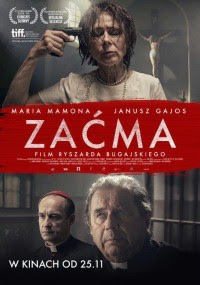Seriousness doesn’t come any higher than
Zacma/Blindness, screened in the Polish Film Festival running parallel
with at least three of those other National manifestations at the moment.
 Director Ryszard Bugajski came to our
attention (after resisting a demand that he turn police informer while working
with Andrej Wadja’s unit) for his 1982 Christina Janda film The
Interrogation which was banned in its native Poland until the fall of the
Soviet Empire, sending Bugajski off to make series TV in the U.S.
Director Ryszard Bugajski came to our
attention (after resisting a demand that he turn police informer while working
with Andrej Wadja’s unit) for his 1982 Christina Janda film The
Interrogation which was banned in its native Poland until the fall of the
Soviet Empire, sending Bugajski off to make series TV in the U.S.
He’s clearly invested in the subject of Zacma,
which manages to get stuck into Judaism, Communism and Catholicism as shades in
an ideological spectrum or some kind of belief system progression. To give it a
bit more weight several of its characters, “Bloody Julia” head of the state
unit set up to eliminate religion in Iron Curtain Poland and her opponent
Cardinal Wyszynski are drawn from history.
When the smoke clears the pair find
themselves among the people still standing, portrayed by the director’s wife
Maria Mamona and Marek Kalita. Her one-time bureau chief character is getting a
bit shaky with a continuing inquiry into her sadistic methods, a ‘phone that
rings without there being anyone at the other end and spooky flash backs to her
excesses and failures. She drives off to a Catholic school for the blind,
promised an interview with the Primate there.
 |
| Maria Mamona (r), Blindness |
The film gets a bit blurry on the line
between reality and her perception of it, with one of her victims having
identified himself as Jesus Christ and doing miracles with the cigarettes that
our heroine is chain smoking - great effects work. Blind priest Janusz Gajos
was supposed to have had his eyes burned out by interrogators (it’s that kind
of film) but still has them in later scenes. Mamona’s meeting with Kalita has
them plowing through notions of guilt, ideology and the existence of God but
when ex-Jew/ex-poet, now nun Malgorzata Zajaczkowska comes into the chapel
which Mamona disrespects, she finds her crouched alone there.
However, we get
less fuzzy characterisation on the groundsman picked out as a police spy and
the pair of cops who grope Mamona in the bar, where a wake is being held,
clearly for real and there's a scene where she tries to off herself with that
pistol in her hand bag.
All this makes a serious American film
like Doubt seem quite jolly. A more interesting comparison is with John
Lvoff’s 2001 L'homme des foules Man of the Crowds which centres on
former torturer Jerzy Radziwilowicz in the post liberalisation era and his
blind (what is this with guilty Communists and blindness?) Department Head and
doesn’t root around in belief systems but puts forward human corruptibility as
the root of excesses.
Is Zacma a work of determined
earnestness? No doubt there. Did it convince me of any basic truth that had so
far eluded me and did it make me feel I’d picked right out of the seven one off
movies I could have been watching last night? I’d have to say no on those
- and it cost twenty bucks, no concessions.
No comments:
Post a Comment
Note: only a member of this blog may post a comment.